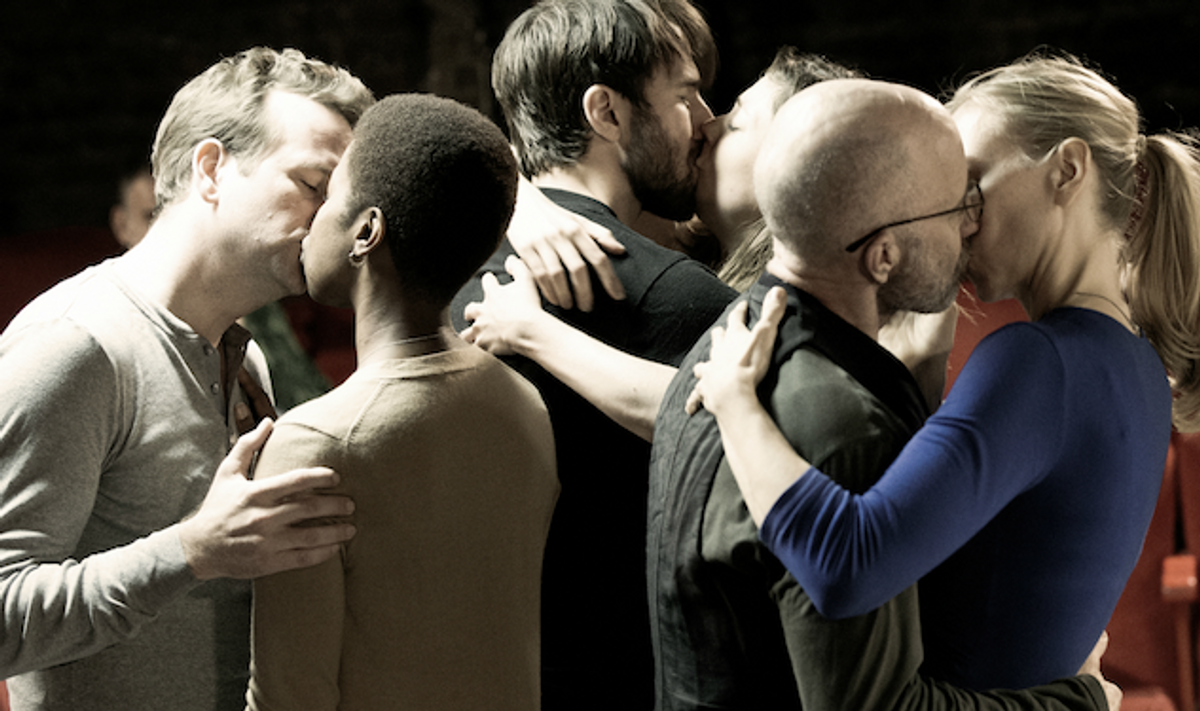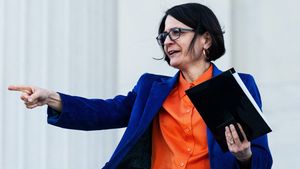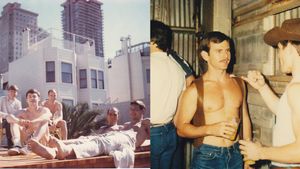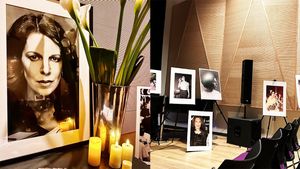A scene from 'Scenes From a Marriage' | Photo by Jan Versweyveld
In a climactic scene in the second act of Ivo van Hove's current must-see staging of Scenes From a Marriage (through Oct. 26 at New York Theatre Workshop), the men and women begin swapping spouses. Except, they're all the same spouse, played by three pairs of actors, representing different stages of their thriving/decaying bonds. It soon becomes a frenzied orgy of kissing and groping and the actors are grinding and bruising one another as they lock lips and change partners. It offers a climax that comes after audiences have watched three different scenarios in the first act from Ingmar Bergman's popular 1974 film of a couple's relationship as it matures and changes--one young, one middle-aged, one more mature--that drives home the idea of memory and endurance and the complexity of one's private interactions. But van Hove admits it's not as tightly staged as audiences may assume. "They know what they are doing, but it's different every night," he says of the potential danger for the men and women in the parts. "It looks very much staged, but it has a freedom."
At a time when so many same-sex couples are fighting for the right to enter into contractual unions sanctioned by the state, it may seem ironic that a gay theater director, who often courts controversy in the United States for his extreme productions of classic plays, stages a sort of cautionary tale about marriage. But he doesn't see it that way. "It's not so bleak," van Hove insists. "In the last scene, after 20 years, they've reached an equilibrium with each other. Even if it's hard to hear this truth. Of course, Bergman is saying that they only find that outside the conventions of a typical marriage. They aren't married to other people at that moment; they meet each other now and then and reinvent each other. I think that's the hope, I don't think it's bleak, that's the mastership of Ingmar Bergman, he's not trying to create an illusion about relationships."
It may simply be the serendipity of worldwide stagings, but this year alone, van Hove has staged three productions that speak to the enduring power (and illusions) of relationships. Earlier this year, the Belgian director premiered theBrokeback Mountain opera in Madrid, written by Charles Wuorinen and Annie Proulx, and next week, his company, Toneelgroep Amsterdam presents its raw interpretation of Tony Kushner's modern classic, Angels in America, at the Brooklyn Academy of Music. So is there a reason all these plays about love and romance and death and dissapointment, including ones with gay men, are being mounted so close together?
"That's a coincidence," he says. "Of course there's a theme: namely love. If you're not interested in it as a theme, why make art?"
Van Hove says that in his long career as a director, he's only done five or six plays that deal with homosexuality. "That's not a lot," he says. "I'm a homosexual myself, but I'm not 100-percent a homosexual. I'm not all day, a homosexual. I have much more things to do deal with than that. I think what attracts me to the homosexual relationship in these plays is that it's a forbidden thing. It's not something you can live out in society; it's hidden and secret. At the same time it, creates a uniqueness between two people. These two people in Brokeback for example, they have a great relationship on the mountain, but in their daily lives, they can't live it out because they would be killed. That's what I'm interested in, not that it's a homosexual relationship on itself."

A scene from the Teatro Real production of 'Brokeback Mountain' | Photo by Javier Real
It's this idea of people, in a universal way, on the prowl for mates, making a life, and struggling through it that appeals to van Hove--no matter what the gender of the people in the pairings.
"I think when I did Taming of the Shrew, it talks about the same thing," he explains. "These two people have a crush on each other, but to the outsiders, this is a dangerous, dark relationship about dominance. But for them, they have a great relationship together, it's the outside world that looks at it that way."
In this way, gay relationships are ripe for theatrical exploration by anyone interested in the conflict that is often at its core--when society rejects their way of loving. "It's not homosexual love, but these sort of tormented relationships, that it's not really accepted by the outside world," van Hove says. "I think deep down, how many times, how is it possible that they live together. You never can judge the love of other people. You never can."
The decision to take on the two full-length plays that make up Tony Kushner's widely lauded Angels in America may not have been the next obvious step. But van Hove says that he wanted to consider it the way he would any other "modern classic," and dissect it the way he did Tennessee Williams' A Streetcar Named Desire or a Eugene O'Neill play--something that has become concretized in collective memory. He doesn't want to over-explain the production--which is on a bare stage and lacks the trappings audiences have come to expect in productions of the plays--but he did consult with Kushner on it.

A scene from 'Angels in America' | Photo by Jan Versweyveld
"Tony Kushner had avoided seeing it in the beginning," van Hove says. "We know each other very well, and he wanted to know: 'Why are you doing it?' He finally came to see it, of course, and he was pleased and shocked at the same time...He thought the set would move in. But nothing moved in. It became a huge mental state rather than a realistic description."
Van Hove says he talked with Kushner a lot about the second play, Perestroika, to better understand it. "He really helped me with hit, and I made my own adaptation out of that. It ended up being very actor-driven and actor-based."
While van Hove used to stick to the classics, with the authors long gone, he's now embraced the challenge of creating (and dismantling) works in which the author is very much still in the picture. He's currently collaborating with Simon Stephens, whose adaptation of The Curious Incident of the Dog at the Nighttime is currently playing to raves on Broadway, on a monologue and next year, his staging of a new translation of Antigone by Anne Carson, starring Juliette Binoche, will premiere in Europe.
"I avoided working with living authors a little bit in the beginning of my career," van Hove admits. "But now I feel much more free and open about this kind of relationship. And I'm enjoying it."
We'll just never quite know -- and have to imagine -- what took place behind those creative closed doors.
Scenes from a Marriage continues through Oct. 26 at NYTW in New York; Angels in America, Oct. 23-25, is part of the Next Wave Festival at BAM in Brooklyn.


























































































